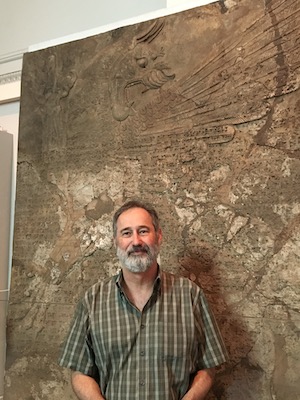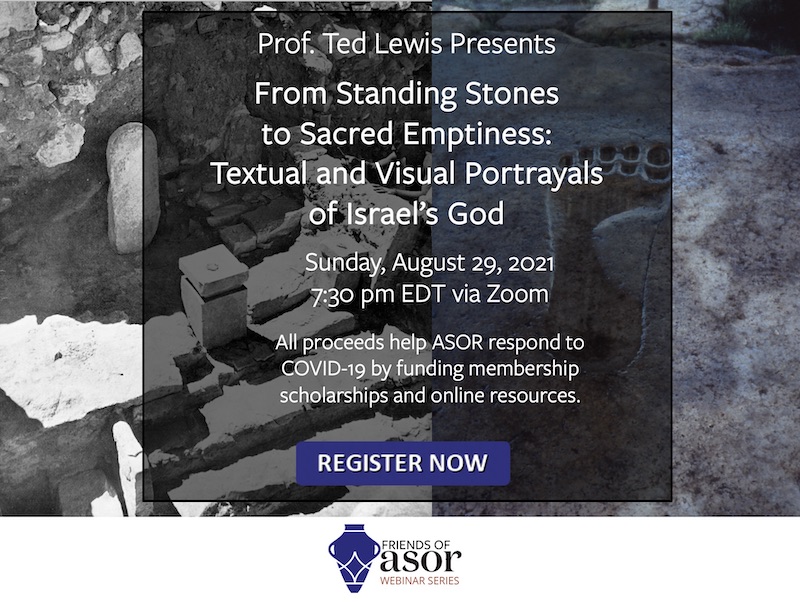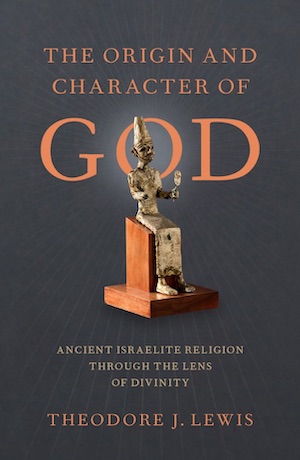
FRIENDS OF ASOR WEBINARS
From Standing Stones to Sacred Emptiness: Textual and Visual Portrayals of Israel’s God
Friends of ASOR present the next webinar in our monthly series on August 29, at 7:30 pm EDT, featuring Prof. Theodore Lewis. Portrayals of divinity are incredibly complex as they are culturally, sociologically, politically, and theologically contingent. Asking the simple question about how ancient Israelites and Judahites portrayed God (i.e. El and Yahweh) turns into a historical puzzle, interacting with a wide variety of ancient writers and artisans on how they conceptualized divinity. Did they imagine Israelite El as an enthroned, benevolent patriarch, a majestic bull, or even a solid block of stone? What about Yahweh and the Hebrew Bible’s aniconic tradition that the Almighty is not to be portrayed in concrete form?
This webinar will sift through both visual (archaeological) and textual narratives as they have diverse functions and/or audiences and reflect different kinds of literacies. We’ll look at artisans’ considerable diversity, from standing stone installations to anthropomorphic figurines to bull images. Even within the Hebrew Bible’s aniconic tradition we see diversity—from the ethereal quality of fire to solar metaphors to abstract notions of Yahweh taking up residence via his sacred “Name” or manifesting through “radiance” (kābôd yhwh) that conjures Neo-Assyrian melammu imagery. Strikingly, we’ll also investigate the use of sacred emptiness to portray divinity. How is it that less is more? Wide ranging questions will be explored and invited. Are there archaeological correlates for such abstract expressions? How do we imagine the pragmatic focal points for ritual performance? Join us for this exploration of some of the expressions of divine presence in the lives of ancient Israelites and Judahites. Prof. Lewis will conclude his webinar with a live Q&A session. For more information on this topic, please check out the speaker’s recent article in The Ancient Near East Today on “The (Historical) Origin of God.”

Lewis is the author of The Origin and Character of God: The Religion of Ancient Israel through the Lens of Divinity (Oxford University Press), which received the 2020 Frank Moore Cross Award from ASOR for “the most substantial volume related to the history and/or religion of the ancient Near East and Eastern Mediterranean.” He is also the author of Cults of the Dead in Ancient Israel and Ugarit (Harvard Semitic Monographs) and co-author of Ugaritic Narrative Poetry. He is General Editor of the Writings from the Ancient World series (SBL Press).

To receive your ASOR member discount, log into the online store. If you are new to ASOR, please click on the “New Visitor Registration” link to register your e-mail address and choose password for our online store. Once logged in, navigate to “Meeting and Event Registration” to register for the webinar and pay the fee. Each paid registrant will receive a confirmation e-mail when you pay for the webinar. If you do not receive this e-mail, then you are not registered. Please e-mail membership@asor.org with any questions or issues with registering.
You will be e-mailed the Zoom Webinar link in the week prior to the lecture on August 29, 2021. If you do not receive the link by the close of business on the Thursday before the webinar, please e-mail membership@asor.org immediately. All webinars are recorded and all paid registrants will be sent a link to view the recording.
All proceeds from this lecture are used to fund scholarships for members impacted by COVID-19 as well as increasing ASOR’s online resources, which are free to the public.
WHY SPONSOR A WEBINAR?
Several levels of support from $50-$1,000 are available. Proceeds go towards membership scholarships and towards increasing ASOR’s virtual resources. Each sponsorship is tax-deductible and you can give your friends free registrations to a webinar!
Bronze Level ($50): up to 2 guest registrations
Silver Level ($100): up to 5 guest registrations
Gold Level ($500): up to 20 guest registrations
Platinum Level ($1,000): up to 50 guest registrations
After you sign up for a sponsorship online or over the phone, email the names and email addresses of your guests to Felice Herman at membership@asor.org, who will send your guests a confirmation and the Zoom link before the webinar.
WANT TO SAVE $5.00 ON THE NEXT WEBINAR?
Join ASOR as a member! Click here for more details about discounts for events and other benefits of membership. Memberships start at $40 for the year as an Associate Member.
Not ready to join yet? Become a Friend of ASOR for FREE!
PAST WEBINARS
You can now purchase the link to the recording of any webinar. You can also purchase the bundle packages of all webinars from the 2020-2022 seasons. Please e-mail membership@asor.org for purchase details.
To see a printable pdf of the webinar titles from the 2020-2021 season, please click here. To see a printable pdf of the webinar titles from the 2021-2022 season, please click here.
Pricing:
Members: $6.00 per recording
Non-Members: $12.00 per recording
Bundle of 2020-2021 Webinars: $75.00
Bundle of 2021-2022 Webinars: $75.00
Bundle of 2020-2022 Webinars: $125.00
2021-2022 Season
A World at War: Protecting Cultural Heritage in Times of Conflict
Patty Gerstenblith (DePaul University), Lisa Ackerman (Columbus Citizens Foundation), Andrew Cohen (Government Professional and Cultural Heritage Expert) | May 12, 2022
Preserving Cultural Heritage in Hisban and Umm al-Jimal, Jordan
Øystein LaBianca (Andrews University), Elizabeth Osinga (Umm al-Jimal Archaeological Project), Darrell Rohl (Calvin University) | April 24, 2022
Back to the Field: Recent Discoveries & Summer Plans 2022
Lorenzo d’Alfonso (ISAW), Kathryn Grossman (NC State University), James R. Strange (Samford University) | April 3, 2022
Uncovering What is Nubian Beneath the Veneer of Egyptianness: Excavating the Archives
Debora Heard (University of Chicago) | March 20, 2022
Where Are They Now?: A Preview of 2022 ASOR-Affiliated Fieldwork Projects
Michael Given (University of Glasgow), Xenia-Paula Kyriakou (Florida Gulf Coast University), Stephen Batiuk (University of Toronto), Monique Roddy (Walla Walla University), Kent Bramlett (La Sierra University), Friedbert Ninow (La Sierra University), and Michael Hoff (University of Nebraska-Lincoln) | March 8, 2022
Excavations at Tel Gezer: A Personal Story
Sam Wolff (Tel Gezer Laboratory) | February 20, 2022
Tel Rehov: A Major Bronze and Iron Age City in the Jordan Valley
Amihai Mazar (Hebrew University of Jerusalem), Nava Panitz-Cohen ( Hebrew University of Jerusalem), Nota Kourou (Athens University), Naama Yahalom-Mack (Hebrew University of Jerusalem), Robert Mullins (Azusa Pacific University) | February 10, 2022
The Not-So-Innocents Abroad: The Beginnings of American Biblical Archaeology
Rachel Hallote (Samford University) | January 20, 2022
Synagogues as Jesus Knew Them
James R. Strange (Samford University) | December 2, 2021
Under Jerusalem: The Buried History of the World’s Most Contested City
Andrew Lawler | November 4, 2021
Jesus and Jerusalem on TV: How Do Bible Documentaries Get Made?
Robert Cargill (University of Iowa) | October 17, 2021
Digging the Divine?: Judahite Pillar Figurines and the Archaeology of Israelite Religion
Erin Darby (University of Tennessee) | October 7, 2021
David, Solomon, and Rehoboam’s Kingdom—The Archaeological Evidence
Yosef Garfinkel (Hebrew University of Jerusalem) | September 19, 2021
From Standing Stones to Sacred Emptiness: Textual and Visual Portrayals of Israel’s God
Theodore Lewis (Johns Hopkins University) | August 29, 2021
2020-2021 Season
Making May Matter: Webinarathon to Endow Diversity
Multiple Speakers | May 21-23, 2021
Archaeogaming: Why Video Games Deserve Their Own Archaeology
Tine Rassalle (University of North Carolina at Chapel Hill), Shannon Martino (Morton College), Matthew Winter (University of Arizona), Michael Zimmerman (Rhode Island) | April 18, 2021
How the Bible Became a Book
William Schniedewind (UCLA) | March 21, 2021
The Mysteries of Mithras in Caesarea: Exploring the Cult’s Rites and Remains
Jane DeRose Evans (Temple University), Alexandra Ratzlaff (Brandeis University) | March 11, 2021
Archaeology and the Hidden Religious Culture of Israelite Women
Carol Meyers (Duke University) | February 21, 2021
Meet the Directors—Fundraiser to Support ASOR’s Affiliated Overseas Research Centers
Matthew J. Adams (AIAR), Pearce Paul Creasman (ACOR), Lindy Crewe (CAARI) | February 11, 2021
Early Synagogues, Jesus, and Galilee—A Jewish Perspective
Eric Meyers (Duke University) | December 13, 2020
Home Sweet Home: Ancient Israelite Households in Context
Cynthia Shafer-Elliott (William Jessup University) | October 18, 2020
Priestesses in the Days of Solomon and Ahab
Susan Ackerman (Dartmouth College) | September 13, 2020
Digging Deeper: How Archaeology Works
Eric H. Cline (The George Washington University) | August 9, 2020
American Society of Overseas Research
The James F. Strange Center
209 Commerce Street
Alexandria, VA 22314
E-mail: info@asor.org
© 2023 ASOR
All rights reserved.
Images licensed under a Creative Commons Attribution-NonCommercial-ShareAlike 4.0 International License
COVID-19 Update: Please consider making payments or gifts on our secure Online Portal. Please e-mail info@asor.org if you have questions or need help.

